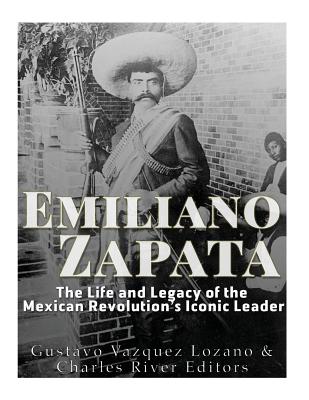Emiliano Zapata: The Life and Legacy of the Mexican Revolution's Iconic Leader

Emiliano Zapata: The Life and Legacy of the Mexican Revolution's Iconic Leader
*Includes Zapata's quotes and descriptions of his life and career
*Includes online resources and a bibliography for further reading "It's better to die on your feet than to live on your knees." - Emiliano Zapata
A little more than 100 years ago a Mexican peasant named Emiliano Zapata gathered a rural army from the plantations and villages of southern Mexico, seized the lands of the haciendas, and began to distribute them among the peasants of Anenecuilco, his hometown, in the state of Morelos. Outraged and impatient with the ceaseless destitution of the indigenous peoples at the hands of the landowners, he had decided to take justice in his hands. His flag was Liberty and Justice, the exact opposites of the two burdens that had tyrannized the rural population: work in semi-slavery conditions and immense inequality.
Zapata, who in a few years assembled a popular army of 25,000, was a unique case in the history of Mexico. His country's past had consisted of opportunist generals revolting against the government seeking not to make justice, but to seize power. Conversely, Zapata was not interested in politics or power plays, except in their most practical and immediate form: to distribute land among the peasants; to allow them to work in peace; and to defend their gains by force of arms. Thus, it was only inevitable that in his time, he was seen as a menace, someone to get rid of in order to return to peace and order.
Nearly a century after his death, Zapata remains an opaque figure. To call oneself a Zapatista in Mexico can get a person in trouble, yet he led one of the peasant rebellions most studied by scholars. Historians have produced biographies that portray him as a hero, such as John Womack in the 1960s, and that of his successor and closest aide, Gildardo Magaña, who wrote one shortly after Zapata's death. More meticulous books have appeared in recent past, like the one by Samuel Brunk, who concedes that the press may have exaggerated Zapata's exploits, but not completely.
Despite the debates, the caudillo of the south continues to shine for his clarity of principles and intransigence, his refusal to compromise with the powerful, and his refusal to be a subordinate. He remained faithful to the death in his struggle for the oppressed, and he always despised power. On those grounds, although surely it was never his intention, Zapata became an international symbol, and as a result, many Mexicans have chose
PRP: 86.34 Lei
Acesta este Prețul Recomandat de Producător. Prețul de vânzare al produsului este afișat mai jos.
77.71Lei
77.71Lei
86.34 LeiLivrare in 2-4 saptamani
Descrierea produsului
*Includes Zapata's quotes and descriptions of his life and career
*Includes online resources and a bibliography for further reading "It's better to die on your feet than to live on your knees." - Emiliano Zapata
A little more than 100 years ago a Mexican peasant named Emiliano Zapata gathered a rural army from the plantations and villages of southern Mexico, seized the lands of the haciendas, and began to distribute them among the peasants of Anenecuilco, his hometown, in the state of Morelos. Outraged and impatient with the ceaseless destitution of the indigenous peoples at the hands of the landowners, he had decided to take justice in his hands. His flag was Liberty and Justice, the exact opposites of the two burdens that had tyrannized the rural population: work in semi-slavery conditions and immense inequality.
Zapata, who in a few years assembled a popular army of 25,000, was a unique case in the history of Mexico. His country's past had consisted of opportunist generals revolting against the government seeking not to make justice, but to seize power. Conversely, Zapata was not interested in politics or power plays, except in their most practical and immediate form: to distribute land among the peasants; to allow them to work in peace; and to defend their gains by force of arms. Thus, it was only inevitable that in his time, he was seen as a menace, someone to get rid of in order to return to peace and order.
Nearly a century after his death, Zapata remains an opaque figure. To call oneself a Zapatista in Mexico can get a person in trouble, yet he led one of the peasant rebellions most studied by scholars. Historians have produced biographies that portray him as a hero, such as John Womack in the 1960s, and that of his successor and closest aide, Gildardo Magaña, who wrote one shortly after Zapata's death. More meticulous books have appeared in recent past, like the one by Samuel Brunk, who concedes that the press may have exaggerated Zapata's exploits, but not completely.
Despite the debates, the caudillo of the south continues to shine for his clarity of principles and intransigence, his refusal to compromise with the powerful, and his refusal to be a subordinate. He remained faithful to the death in his struggle for the oppressed, and he always despised power. On those grounds, although surely it was never his intention, Zapata became an international symbol, and as a result, many Mexicans have chose
Detaliile produsului











